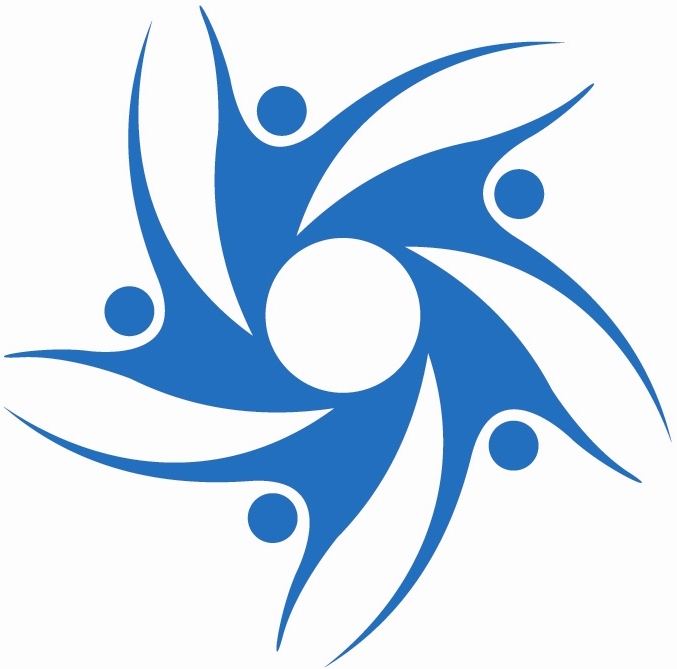Save the date
Central European Summer Time
Saturday
8 May
6:30 – 10 PM
Sunday
9 May
10 AM – 6 PM
Monday
10 May
4:30 – 9:30 PM
Tuesday
11 May
4:30 – 9 PM
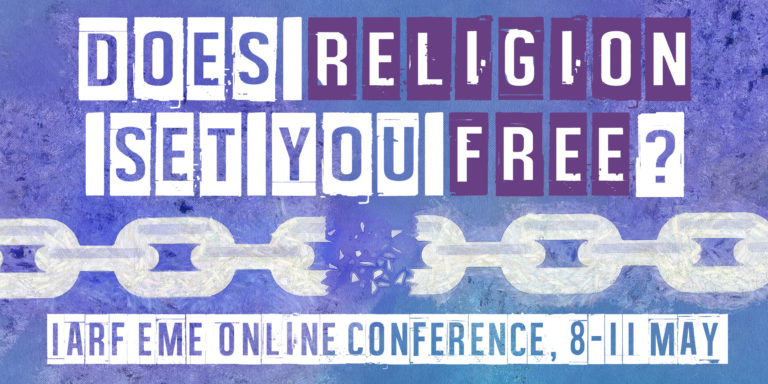
We set out to explore some aspects of the relationship between religion and liberty – through lectures, workshops, circle groups and a panel – to offer you an interesting mix of learning, sharing and socializing. There will also be an opportunity to meditate or pray together at interfaith devotions.
Save the date
Central European Time
Saturday
8 May
6:30 – 10 PM
Sunday
9 May
10 AM – 6 PM
Monday
10 May
4:30 – 9:30 PM
Tuesday
11 May
4:30 PM – 9 PM
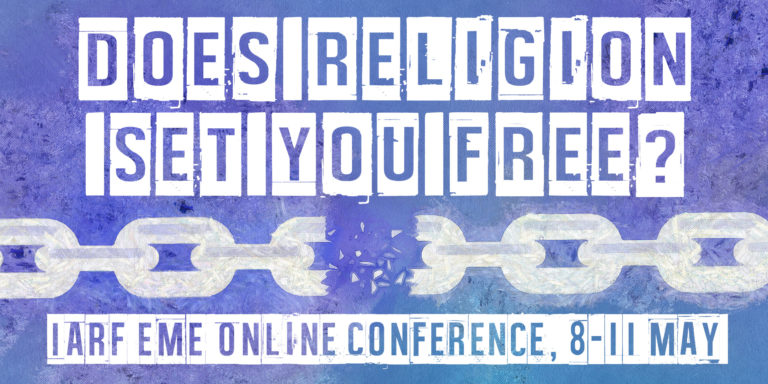
We set out to explore some aspects of the relationship between religion and liberty – through lectures, workshops, circle groups and a panel – to offer you an interesting mix of learning, sharing and socializing. There will also be an opportunity to meditate or pray together at interfaith devotions.
-
back to top
-
About
-
Register
-
Speakers
-
programme
- Contact us
About
EME Conferences
The EME, the Europe and Middle East region of the IARF, organizes quadrennial conferences that have always fallen in between World Congresses. The most recent one was to be held in 2020 in Hungary, but it had to be cancelled due to the pandemic. We are now venturing into an unknown yet exciting territory – a wholly digital event. As much as we regret not being able to provide an opportunity for face-to-face encounters, we hope more people will be able to attend and that the experience we obtain will help us in the future to reach more individuals and communities than ever before.
Religion and liberties
Incidentally, this year marks the 120th anniversary of the first World Congress of the International Association for Religion Freedom. Now, several generations later, there are still people who share the aspiration of the men and women who came together in 1901 – to unite pure religion and perfect liberty. The relation of religious freedom to other rights and liberties, as well as the role religion played and continues to play with respect to personal liberties and emancipation, is a much debated issue in many societies – perhaps even increasingly so in recent years as distances shrink, people of various cultures coexist on a previously unknown scale and the market of ideas and beliefs is larger and more diverse than ever. It was and continues to be our ambitious mission and dream to reconcile religion and liberty for the benefit of all, and we organise this conference in hopes of deepening our understanding, strengthening our bonds and challenging ourselves.
It isn’t an abstract legal concept
As the International Association for Religious Freedom, our mission is to advocate for freedom of religion and belief, to educate the public about its origins, legal grounding and significance for contemporary societies in cooperation with other organisations, governments and international bodies to stand up for those whose rights are violated. However, we do not serve an abstract idea or a legal principle. We are not competing with other organisations and activists to strengthen religious freedom at the expense of other rights, such as freedom of expression, the prohibition of torture and inhuman treatment or the right to self-determination of every individual. In fact, the ultimate concern that we share with all people of good will is the human being, whose dignity, in accordance with foundational documents of the democratic order, such as the Universal Declaration of Human Rights and the European Convention on Human Rights, we believe to be inherent and inviolable. All rights and freedoms stem from this primary belief. Accordingly, religion and religious freedom that we strive to protect must ultimately serve the human being in their free pursuit of happiness and personal growth. If this is not the case, we cannot support it. It is a difficult task to weigh one human right against another. But it is a task not only for our courts and tribunals that adjudicate on conflicts arising within our legal systems; it is also the task of the free conscience of every human being, and in this context especially those of us who consider themselves religious people.
Our attitude
We believe it is our duty in the first place to scrutinise and apply critical methods to values, beliefs and traditions that we hold dear. As members of the IARF, religious people of different traditions – Christians, Unitarians, Jews, Muslims, Pagans, Sikhs, Zoroastrians, Hindus, Buddhists, Shintoists, Baha’i’s, people with multiple religious identities and many others – we draw inspiration and strength from our faith, but at the same time firmly resolve not to cast a blind eye to the dark pages of our histories and the challenges and ambiguities of the present.
The questions
At the conference we will look closer at many different aspects of the relationship of religion and freedom – in the past and the present. What was the emancipating influence of religious thought and practice? In what ways have we failed ourselves and our neighbours by creating or reinforcing different forms of enslavement? How can we better serve the cause of freedom as religious people?
The content
There will be lectures, workshops, circle groups, devotions and social events to help us learn from each other, challenge each other and motivate each other to working for the benefit of our neighbours. Please come if a particular topic from the programme interests you or if you would like to share your thoughts or experiences.
The Conference is open to everyone. It is not a purely academic event, your presence and contribution will be appreciated regardless of your background. Has religion been a liberating factor in your life? Or have you been struggling to break free of the constraints you felt it imposed on you? We’re looking forward to telling our stories and listening to yours!
Speakers, worship leaders and performers
Keynote speaker
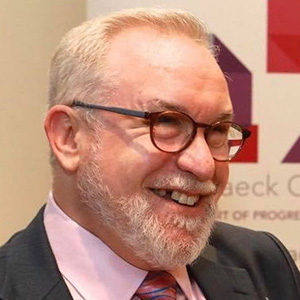
Rabbi Mark Solomon
Rabbi Solomon’s lecture will be held on Sunday 9 May at 1:30 PM.
Rabbi Solomon is minister of the Edinburgh and Leicester Liberal Jewish Communities, Senior Lecturer in Rabbinic literature and Jewish philosophy at Leo Baeck College (London), and Rosh Beit Din (chair of the rabbinic court) and Interfaith Consultant for Liberal Judaism. Born in Sydney, he began rabbinic studies at Chasidic yeshivot in Melbourne and Israel, before taking time out to gain a BA (Hons) in English at Sydney University. He came to Britain in 1988 to complete rabbinic studies at the modern-orthodox Jews’ College, where he was ordained in 1991. Not long afterwards, he came out as gay and moved to Liberal Judaism, where he has served several congregations, including The Liberal Jewish Synagogue, the movement’s mother congregation in London. He completed an MA in medieval Jewish philosophy at Leo Baeck College, where he has taught for thirty years. He is also a cantor and gives recitals of liturgical, Chasidic and Yiddish music. With a life-long passion for interfaith dialogue, he is deeply involved with the Council of Christians and Jews and is co-chair of the London Society of Jews and Christians. He helps organise the annual Jewish-Christian Bible Week and the JCM Conference, both based in Germany. He has a long involvement in work with HIV-AIDS charities and the Jewish LGBT+ community, and edited Liberal Judaism’s Covenant of Love: Service of Commitment for Same-Sex Couples (2005), the first such Jewish liturgy ever published. He lives with his partner in north London.Rabbi Solomon is co-chair of the London Society of Jews and Christians, a trustee of the London HIV Chaplaincy, and co-convenor of Westminster Scriptural Reasoning. He is a past board member and branch chairman of the Council of Christians and Jews, for whom he frequently gives talks and concerts. He is a regular participant and speaker at the annual Jewish-Christian-Muslim conferences and Jewish-Christian Bible Week in Germany.
Panelist
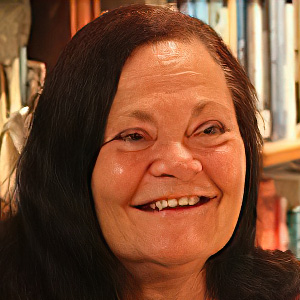
Morgana Synthove
Morgana Synthove will participate in the panel on Tuesday 11 May at 5:15 PM.
She is a Gardnerian Wiccan High Priestess and the International Coordinator for the Pagan Federation International, an international Pagan organization. Over the years, she has facilitated a variety of Gardnerian Wiccan groups, and is co-editor of the international and bilingual Wiccan Rede magazine, which was launched in 1980, as well as coordinator of the Silver Circle, a Wiccan network in the Netherlands. Morgana travels extensively giving lectures and represented the PFI at the “World Parliament of Religions” in July 2004 in Barcelona, Spain and in 2014 in Utah, USA. In 2006 she represented the PFI at the EU conference “Intercultural Dialogue, Best Practices” in Brussels, Belgium and in addition to lecturing at various inter-religious and European indigenous religion conferences, in 2007 she began presenting “Wicca Intensive” studies throughout Europe, Russia, Scandinavia and the United States.
Panelist
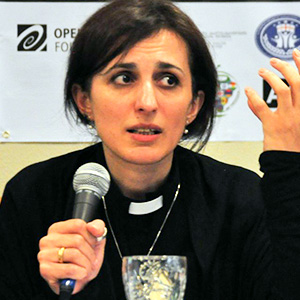
Rt. Rev. Rusudan Gotsiridze
Bishop Gotsididze will participate in the panel on Tuesday 11 May at 5:15 PM.She is a bishop of the Evangelical Baptist Church of Georgia and a women’s rights activist. She was the first female Baptist bishop in Georgia. She has advocated against gender violence and for women’s equality, and created interfaith dialogues to support religious minorities. She was also one of the first members of the religious community in Georgia to publicly support the rights of the LGBT community. She also spoke at the 6th United Nations Forum on Minority Issues about religious minorities in Georgia.
She received a 2014 International Women of Courage award.
Panelist
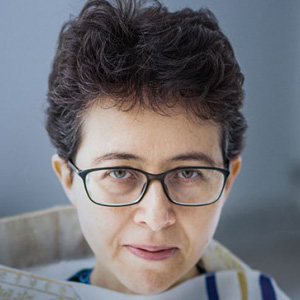
Rabbi Malgorzata Kordowicz
Rabbi Kordowicz will participate in the panel on Tuesday 11 May at 5:15 PM.She graduated Hebrew Studies at the Warsaw University, taught Hebrew at numerous universities in Poland and currently – in Ginczanka Secondary School in Warsaw. She published two books: prayer book for children in Polish and Hebrew and elementary Hebrew book originally published before WWII with modern commentaries. She cooperated with many Jewish magazines in Poland and now writes for Tygodnik Powszechny.
She is a first Pole to graduate (in 2016) JTS in New York and became a rabbi. She serves the Jewish Community in Warsaw and teaches in the Jewish Theology Department at the Potsdam University, where she educates rabbis and cantors.
Panelist
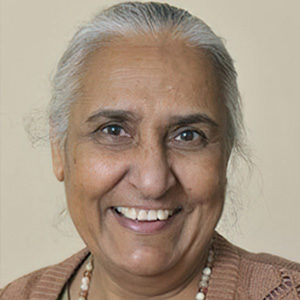
Charanjit Ajitsingh
Charanjit Ajitsingh will participate in the panel on Tuesday 11 May at 5:15 PM.She is a retired educationist and has served in various capacities as a lecturer, principal, director and an OFSTED inspector. A Sikh by faith, she chairs Hounslow Friends of Faith and is a member of the of Richmond Interfaith Forum (previously Vice Chair), one of the Vice Presidents of the World Congress of Faiths and a trustee of the British Chapter of International Association of Religious Freedom. She also represents her faith community on Richmond Standing Advisory Council of Religious Education (SACRE). She has lectured in national and international conferences on Interfaith relations and is on the editorial board of an Interfaith Magazine. She contributes regularly to faith based publications (fifty+) and is the author of the book ‘Wisdom of Sikhism.’
Panelist and devotion leader

Muezzin Susanne Dawi
Muezzin Dawi will participate in the panel on Tuesday 11 May at 5:15 PM.
She will also lead the devotion on Tuesday together with Said TouhamiShe was born in Berlin, Germany, in 1964. As a fourth grade teacher in a bilingual school and a mother of six adult children and grandchildren, she finds her life joyful and richly blessed. Miss Dawi came to the Ibn Rushd-Goethe mosque on its opening day on 16 June 2017 by chance, without knowing any of the agenda, but soon learned to appreciate liberal islam as the only way for her to understand and live religion. Its honesty, sincere appreciation of every individual, and focus on gender inclusion appeal to her. Ever since this opening ceremony, where she was asked to call for the evening prayer, she has been regularly calling for the Friday prayers in this inclusive congregation in front of women and men, a wold-wide novelty and still considered atrocious by many, if not most, of the Muslim world; a world which often deliberately, and sometimes unknowingly, ignores sources of women leadership even throughout the history of islam and still causes an undue amount of human pain by driving homosexual believers into the secrecy of hidden relationships. Miss Dawi has not studied theology, but is an interested and engaged scholar of Islam and functions as one of the leaders of her community.
Speaker
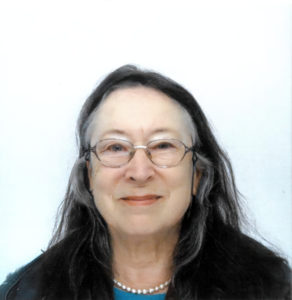
Rev. Dr. Esther Suter
Rev. Suter’s lecture will be held on Monday 10 May at 5:15 PM.She is an ordained minister in the Swiss Reformed Church. She worked as a pastor
in congregations, as a chaplain in a university hospital and as a volunteer pastor in the Trinity
Presbyterian Church of Hell’s Kitchen, a poor area of Manhattan, New York.
She grew up in Switzerland and wanted to study medicine. But her family did not allow her to
go to college and university. So she first worked as a trilingual secretary, (in Paris from 1968-
1970), prepared for maturity, studied languages and theology, while earning her living. She
focused on Ecumenism and Interfaith Dialogue and wrote her Masters on “Die Erfahrung der
Transzendenz in Mystik und Zen-Buddhismus und ihr Ausdruck in der Kunst” by Fritz Buri in
Basel.
Working in a partnership programme of the Federation of Swiss Reformed Churches with
Presbyterian Churches in South Korea (1993-1995) allowed her various official trips and
stays in South Korea, where she got involved into issues of reunification and nuclear
disarmament. Issues of Peace and Reconciliation became central to her.
From extended journeys in Latin America and Africa (1982; 1985) she realized projects, e.g.
a shelter for street children in Santiago de Chile during military dictatorship.
As journalist she participated 1985 in the 3 rd UN-World Conference of Women in Nairobi and
1995 in the 4 th UN-World Conference of Women in Beijing. In 2010 she was a delegate of the
World Council of Churches to the annual session of the UN-Commission on the Status of
Women (CSW) in New York and as speaker invited to the NGO CSW in New York. Since
2012 she participated as an NGO delegate of the International Alliance of Women (IAW) in
the annual CSW-sessions in NY till today (now virtually). She regularly published articles
about these events in three languages.
In 2010 she got involved with the “International Association of Liberal Religious Women”
(IALRW, since 1910, https://ialrw.org ) at their 100 th year Jubilee in Kochi (India), where she
also met with the International Association for Religious Freedom (IARF, https://iarf.net ) at
their 33 rd congress. Since 2014 she is Vice-President of IALRW and has co-organized an
“Interfaith Seminar” at their congress in Kuala Lumpur (Malaysia) in 2017.
Since 2014 she is IAW NGO-Representative for Human Rights at UN-Geneva; since 2017
she is IARF NGO-Representative for Human Rights at UN in New York and since 2018 also
in Geneva (since 2020 as IARF-Main Representative).
In 2018 she co-founded the organization Swiss Interfaith Women, which is a member of
IALRW. Their first project – an interfaith, intercultural and international Youth Camp
„Religion and Art“ on Peace for young women – took place in Switzerland in 2019 and in
2020 with a successful exhibition of their created art work.
During Covid-19 lockdown she promoted with her Doctoral Thesis in Systematic Theology
on “Das Existenzverständnis bei Fritz Buri (1907-1995)” at the Theological Faculty in Basel.
Her interests are in Women’s Rights, Feminist Theology, Ecumenism, Interreligious
Dialogue, Nuclear Disarmament, Peace as a Human Right, Peace on the Korean Peninsula,
Arts, Languages (German, French, English, Spanish, Latin, Hebrew, Greek, Chinese) and
Chinese Medicine.
Workshop Leader
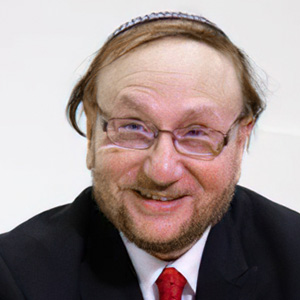
Dr. Tsvi Blanchard
Rabbi Blanchard will lead one of the workshops on Sunday 9 May at 3:30 PM.Tsvi Blanchard is a catalyst for change. Longtime social advocate, psychologist, teacher and rabbi, he has been in the forefront of promoting inclusive, vital Jewish communities in the 21st century. An expert in community and leadership development, he is a recognized leader in the Jewish healing movement.
Connecting ideas to people’s lives has always been part of Blanchard’s work. An ordained Orthodox rabbi, he holds Ph.D.’s in Psychology and Philosophy, was a professor of philosophy, and director of the Ida Crown Jewish Academy in Chicago. He has taught at Washington, Northwestern and Loyola Universities, as well as the Drisha Institute for Women, the Jewish Theological Seminary, and the Wexner Heritage Foundation. The Director of Organizational Development at Clal-The National Jewish Center for Learning and Leadership, he is a practicing clinical and organizational psychologist New York.
In addition to Blanchard’s work on issues of ethics, healing, spirituality and the environment, he is an active voice for Clal’s mission of religious pluralism and diversity, and a participant of the Center for Christian–Jewish Understanding. In 2007, he joined a small delegation of bishops and rabbis for a private meeting with Pope Benedict XVI in Rome (his second meeting). Additionally in 2007, he was invited to the renowned Humboldt University School of Law in Berlin by Professor Bernhard Schlink, the pre-eminent German author (The Reader), lawyer, judge and jurist, and was named the Meyer-Struckmann Professor of Jewish law at the University. Also an adjunct professor at Fordham Law School, Blanchard teaches Jewish law and a continuing legal education program based on his work in Germany.
A popular and speaker and consultant, Blanchard has appeared in the media on such programs as The Oprah Winfrey Show and Eye on Religion. His most recent articles are “In My Flesh I See God: A Neurobiological Perspective on Being Human,” (Tikkun); “Law and Redemptive Narrative: Genesis as a Cultural Resource in the 21st Century,” (Hebraic Political Studies); and a chapter in Why Study Talmud in the 21st Century. In 2006, he was featured along with Elie Wiesel in the documentary Turn to Me. A participant in Psychoanalytic Perspectives: A Journal of Integration and Innovation’s (2006) roundtable discussion on psychoanalysis, spirituality and religion, he is a Reisman Award winner for his article “How to think about being Jewish in the 21st Century.” Co-author of Embracing Life & Facing Death: A Jewish Guide to Palliative Care (CLAL, 2003), he wrote the introduction for photographer Frederic Brenner’s acclaimed book, Diaspora: Homelands in Exile (Harper Collins, 2003).
Workshop Leader

Rev. Pascal Schilling
Rev. Schilling will lead one of the workshops on Sunday 9 May at 3:30 PM.He has been working for the Free Religious Congregation in Offenbach am Main, near Frankfurt, Germany since 2014. He studied Linguistics, Psychology, Cultural Studies and History and focused on religious content in these disciplines. In 2016 he was elected minister of his congregation in Offenbach and strengthened his connections with the IARF by visiting the World Congress 2014 in Birmingham. In 2018 he became the chair of the IARF group for Europe and the Middle East and the vice chair of the German Chapter of IARF. His congregation is rooted in a tradition of working with and for the IARF because the Rev. Diether Gehrmann, who was reverend in Offenbach from 1958 till 1967, and after that was a Unitarian minister in the USA, was the first full time General Secretary of the IARF and served the Association from 1972-1990.
Speaker
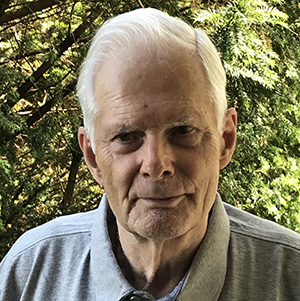
Dr. Andreas Roessler
Dr. Roessler will participate in the lecture on Monday 10 May at 5:15 PM as respondent.1965 Ordained Lutheran Pastor.
1966 STM (Master of Sacred Theology) at Union Theological Seminary New York.
1968-1971 Tutor (Repetent) at the Evangelische Stift in Tübingen.
1971 Doctor of Theology at the university of Tübingen (dissertation about the homiletical
theory in the work of Paul Tillich).
1971 Parish minister in Stuttgart. 1978 minister for ecumenical studies in the Lutheran
diocese of Württemberg. 1992-2013 chief editor of the „Evangelisches Gemeindeblatt für
Württemberg“ (the church journal for the Lutheran diocese of Württemberg).
Since 1969 member of the „Bund für Freies Christentum“. 1971-2015 on the guiding board
(Vorstand) of the Bund für Freies Christentum. 1987-1990 General Secretary of the Bund für
Freies Christentum. 2004-2012 chief editor of the journal „Freies Christentum.
1973-1994 active in IARF. For some years leader of IARF-Commission I (the theological
commission).
Newest publication: „Denkwege eines freien Christentums“ (Verlag Traugott Bautz,
Nordhausen 2020).
Speaker and Moderator
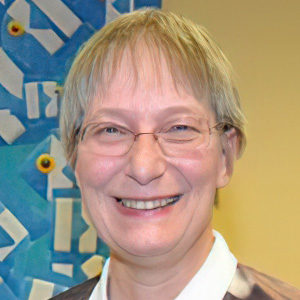
Rev. Wytske Dijkstra
Rev. Dijkstra will lead one of the workshops on Sunday 9 May at 3:30 PM.A Remonstrant [Liberal Protestant] since 1980, she has recently joined the [Dutch & equally liberally minded]
Mennonites. She has a background in Dutch literature and cultural histoy, specialising in 16 th
century reformation thought. She studied at the Remonstrant Seminary from 1986 – 1989. In
2000 she succesfully completed the theological course of the Institute for Liberal Religious
Pastoral Studies in Bilthoven with a thesis entitled “Beyond Boundaries” on the use and
practice of international interfaith encounters and partnerships. Recently [2017] she has
completed a course on Mennonite Theology. She was minister of the NPB congregation of
Renkum in 2003/2004; she currrently serves Reformed, Liberal, Mennonite, and independent
congregations, as well as hospitals and care homes, preaching as a minister at large. Active
for IARF since 1998, she initially served the Dutch Chapter and was the chair of the IARF
European and Middle Eastern [IARF EME] regional council form 2006-2016. As such, she
led four regional conferences [Belfast, UK ‘06; Mannheim/Ludwigshafen, Germany ‘07;
Elspeet, Netherlands, ’12; Tetovo, Macedonia, ‘16] and strengthened its organizational
framework. She served IARF as an IARF International Council member from 2010-2014 President from 2014 to 2018. Presently she serves as IARF’s representative to European Union bodies and the UN.
Workshop Leader
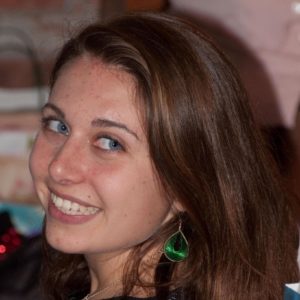
Julia Zubiago
Julia Zubiago will lead one of the workshops on Sunday 9 May at 3:30 PM.She is a public health professional living and working in the northeast US. During college, she worked with an Interfaith Council to organize interfaith events across her campus with a social justice lens. She also organized discussion events around feminism and LGBT+ issues within her college Catholic community. In recognition of these efforts, she had the opportunity to attend the 2018 “Re-Imagining Interfaith Conference” (and the The International Association for Religious Freedom’s 35th World Congress) in Washington DC, where she was inspired by the mission of IARF. With the board of the IARF-US chapter, she has organized several Zoom discussions in the wake of the uprisings for racial justice in the US, where IARF-US members were asked to consider their privileges and responsibilities as people of faith to participate in ending white supremacy. She is excited for the opportunity to facilitate dialogue with the IARF-EME community.
Workshop Leader
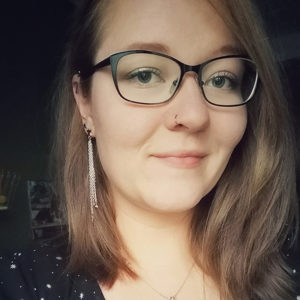
Alexandra Wegel
Alexandra Wegel will lead one of the workshops on Sunday 9 May at 3:30 PM.She is a member of the Free Religious Congregation in Offenbach am Main, Germany. She’s studying education, culture and anthropology and focuses mainly on topics revolving around gender equality and LGBTIQ+ issues. In 2012 she attended her first EME conference in Elspeet, and has been working with the IARF/EME since then. In 2018 she had the opportunity to attend the IARF 35th World Congress and the “Re-Imagining Interfaith Conference” in Washington DC.
Devotion leader
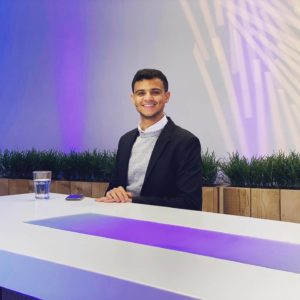
Said Touhami
Said Touhami lead the devotion on Tuesday 11 MayBuilding networks and (physical) points of reunion for diverse communities, especially in highly diverse urbanised regions on a weekly basis in the city of Almere. Using dialogue and mediation-methods that improve active listening and understanding of opposing viewpoints. As a student of public manager, I aspire to translate insights of local experiences to international relations and diplomacy.
Performer
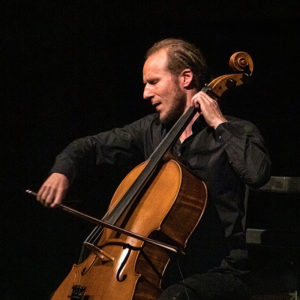
Christopher Herrmann
Christopher Herrmann will perform live on Sunday 9 May at 6 PM.Christopher Herrmann has been creating different musical landscapes on baroque, modern and electric cellos. In addition to classic and his interest in their modernity has made him curious about music from other cultures and Jazz inspires you to develop your own musical language. He has toured with his ensembles in the USA, England, Romania, Switzerland, Austria, France and Italy. As a composer, he wrote two cello concertos, three cello solo suites and fantasies, as well different string quartets and quintets, works for larger ensembles and Songs. In 2014 he founded the “orchestra of truth” with which he shared his own ideas and those of others Composers / songwriters realized, supported by musicians and artists different cultures. In 2016 he founded his own label “cellosophie” under which the CD “Please wait” was published by CelloMeetsJazz. Christopher Herrmann also performs as a pianist, guitarist and violinist on. In addition, he has been working as a lecturer for Emanuel Feuermann since 2015 Conservatory in Kronberg im Taunus.
Performer
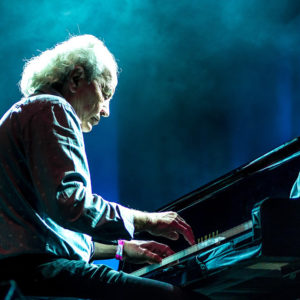
Matthias Frey
Matthias Frey will perform live on Sunday 9 May at 6 PM.The musician, film score composer and pianist Matthias Frey is a musical exception: countless international concert tours, compositions for film and television, the management of important festivals and renowned awards are the cornerstones of his career. His compositions and the astonishing richness of sound of the prepared concert grand piano, which he also plays like a stringed instrument, echoed his joy in dialogue with other cultures. He travels as a soloist or with his own ensembles in Germany and Europe and makes concert tours in Africa, the Middle East and Asia.
“Der Spiegel” describes his music as “a mixture of contemporary, tonal music, jazz and folkloric elements – a fascinating chamber music!”
Performer
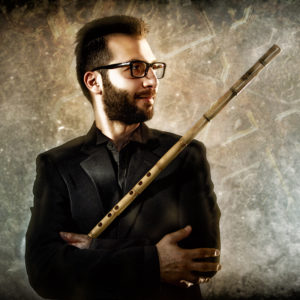
Rageed William
Rageed William will perform live on Sunday 9 May at 6 PM.Rageed William Nay & Duduk (Oriental & Armenian Flutes) is an Iraqi musician, composer, arranger and sound engineer. He studied oriental music at the Institute of Musicology in Baghdad with the most important teachers of Iraq. In Germany he studied audio technology. He plays two of the oldest musical instruments, the nay (oriental flute) and the duduk (Armenian double-reed woodwind instrument) as well as keyboard and arranges music.
He performs in Germany and the Middle East with various philharmonic orchestras and in opera houses, such as the Berlin Philharmonic, Elp Philharmonie Hamburg, Opera Frankfurt, Opera Cairo… etc, and was invited to many important music festivals in Europe, the Middle East and the USA.
Programme
Saturday 8 May
6:15 PM
Zoom Session Opens
6:30 PM
Opening
Word from IARF President, Robert Ince, and EME Chair, Rev. Pascal Schilling, interspersed with recordings of music performances by the Interfaith Band of the Interfaith Encounter Association from Israel and video clips with greetings and introductions from various IARF member communities and groups.
7:30 PM
Devotion in the Unitarian tradition
8:00 PM
Presentation: Past EME Conferences
8:30 PM
Get-Together
Time for social interaction; not moderated.
9:30 PM
9:35 PM
Overview of Tomorrow’s Events
Sunday 9 May
9:45 AM
Zoom Session Opens
10:00 AM
Devotion
10:30 AM
Break
10:45 AM
Circle Groups
Moderated by Gudrun Hahn
When you visit a conference, you know that you will hear a lot and say little.
Circle groups are different. The idea is that you sit together with a small number of participants, between five and eight people. Everybody gets a chance to talk and everybody listens. Subjects discussed do not necessarily refer to the conference theme. They definitely do refer to the lives of the people sitting in the group. So you can be sure: I can contribute, I have something to say.
Maybe you will see the members of your group throughout the conference in various places. It is always good to see a familiar face.”
12:30 PM
Break
1:30 PM
Keynote Talk: Our Home, Not Our Prison
by Rabbi Mark Solomon
This talk is dedicated to the memory of Rabbi Lionel Blue, a much-loved writer and broadcaster, and the first openly gay rabbi in Europe. He was fond of quoting his teacher, who said ‘Religion should be your home, not your prison.’ Too often, in the past and the present, religion has been an abusive home, or even a prison in which deed, word and thought were harshly policed. Our religious traditions, nevertheless, enshrine the value of freedom – both the inner freedom of the individual and the liberation of enslaved and oppressed people. What sort of freedom is this, and is it conditional or unconditional? We will explore the liberating dimensions of religion in traditional teachings and symbols – such as the Exodus paradigm – as well as through the perspective of social psychology and the speaker’s personal experience.
3:00 PM
Break
3:30 PM
Workshops
The workshops will be offered simultaneously. Participants will be given a choice a few days before the conference.
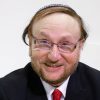
Two Paradoxes
By Rabbi Tsvi BlanchardOngoing spiritual renewal is the most profound basis of all real human freedom and, at the same time, human freedom is the necessary ground of spiritual renewal. Additionally, insofar as religion is a genuine expression of spirituality it draws its power from its capacity to create and sustain freedom and only if a religion is rooted in human freedom can it foster spirituality. I will explore the way in which Jewish tradition confronts these two paradoxes.
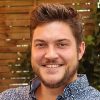
Relationship Between Truth And Freedom – Religion’s Heritage And Burden
By Rev. Pascal Schilling The scriptures of most religions tell the one and only truth. Their content is how to live, how to die, how
to act socially. These dogmas and guidelines give support and strength, but they could also impose
restrictions upon individual freedom. A simple example: in the Abrahamic tradition god is almighty,
omniscient, and omnipresent, but theodicy reveals the conflict between this religious truth and our
freedom in this world, many parts of which are struggling with hunger and illness. How do we reflect
such conflicts and situations in dialogue with ourselves and our religious community? Where to begin
this internal dialogue? We will start this journey with a short story about freedom and truth hiking
through the world.
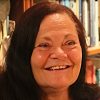
Championing Freedom of Religion and Belief
By Morgana SynthoveHarassment, discrimination, leniency regarding hate crimes, laws that favour particular faith groups, restrictions on religious practices, all are infringements on Freedom of Religion and Belief [FoRB] and will frequently lead to more serious crimes against humanity if not exposed and counteracted.
This workshop will be aiming at bringing together activists and lobbyists on FoRB. In his recent ‘IARF motivational talk’ Chris Hudson (IARF British Chapter, Ireland) suggested that to achieve peace, working at grass root level was more productive and more effective in the long run than working through politics. Does the same go for us? Which groups would be good, from an IARF perspective, to work with? What alliances to forge? Topics will include how to lobby parliamentarians, both national and European. Which opportunities exist to make our voices heard, to gather information, to draft reports? How to involve the press.
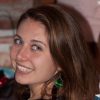
How Does Religion Interact With Climate Change?
By Julia Zubiago, Alexandra Wegel, Natascha Friedrich
How do our individual faith/religious practices teach about the relationships between humans and the earth? How does religion interact with climate change? We will be discussing the ways that our faiths teach about responsibility to protect the earth, and think about actions we can take. Please bring a pen and paper to write your thoughts
5:45 PM
Break
6 PM
Live Music Performance
by Ansamble Unter freiem himmel
Piano, duduk, viola d’amore and cello have come together “beneath the open sky” in order to capture the worldly sound of our planet and convey it to the heart of the listener. When between Matthias Frey, Rageed William and Christopher Herrmann African rhythms meet Armenian melodies and Asian musical language, spaces for dialogue emerge that span centuries-old boundaries. The bringing together of these different worlds of sound and rhythm shows that harmony between people’s cultural worlds is possible, a harmony that brings people together in the spirit.
Monday 10 May
4:15 PM
Zoom Session Opens
4:30 PM
Devotion
5:15 PM
Lecture: How Do We Become Human?
by Rev. Dr. Esther Suter and Rev. Dr. Andreas Roessler (as respondent)
This Lecture is about the Understanding of Existence by Fritz Buri (1907-1995), a Swiss protestant liberal Pastor, Professor of Systematic Theology and disciple of Schweitzer and Jaspers. His theology and historic background was connected with IARF, “Freies Christentum” and Unitarians from 1936-1955 (1975). He bridged various backgrounds, also in interfaith dialogue especially with Zen-Buddhism and Confucianism at an early stage. His philosophical approach to Jaspers and to existentialist philosophy influenced his reflexions on Symbol and Self and he described the symbol of a universal cosmic Christ in “The Buddha-Christ as the Lord of the True Self. The Religious Philosophy of the Kyoto School and Christianity”.
The Lecture is held in form of a dialogue with Rev. Dr. Andreas Rössler (Germany) as Respondent; former Board member of the Internationale Fritz Buri-Gesellschaft für Denken und Glauben im Welthorizont (1996-2008). Does Buri still give a basis for reflexion today? His searching for an ethical standpoint replies to the title of the lecture: How can We become Human?
6:45 PM
About Tomorrow
6:50 PM
Break
7:15 PM
8:45 PM
EME Business Meeting
General Meeting of IARF EME Member Groups and Chapters. Observers are welcome.
Tuesday 11 May
4:15 PM
Zoom Session Opens
4:30 PM
Devotion
5:15 PM
Panel: Will Religion Set Us Free?
The panel consists of female religious leaders from far and wide in Europe; a few are IARF ‘diehards’, most are new to IARF. The range of belief systems and communities represented will also be wider than ever before. Submerge yourself in the wealth of age old cultures and more recently developed religions by joining the audience with a chance to submit your own question to one of the panellists.
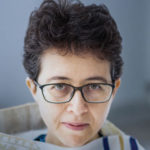
Rabbi Małgorzata Kordowicz
Judaism
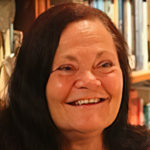
Morgana Synthove
Paganism
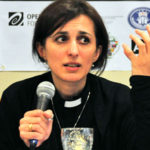
Rt. Rev. Rusudan Gotsiridze
Christianity
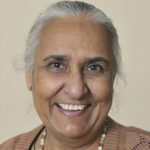
Charanjit Ajitsingh
Sikhism

Muezzin Susanne Dawi
Islam
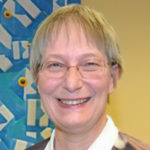
Rev. Wytske Dijkstra
Moderator
7:15 PM
Break
7:45 PM
Getting to know the EME communities: group conversations
8:45 PM
Closing
Registration
If you cannot afford to pay the price for admission (10 EUR), please contact us.
After completing the registration you will receive a link to information on Zoom sessions.
Contact us
Our Administrator will be happy to assist you. You can contact him by email at [email protected], by telephone or WhatsApp/Telegram (+31641744951), and on Skype (iarf_skype).
